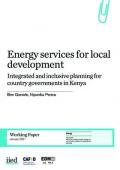This research paper profiles the state and trends in wastewater management and sanitation delivery in Africa; highlights the human health and ecosystem impacts of poor sanitation and wastewater management; and discusses the continent’s policy and institutional arrangements.

This working paper is based on the EDM Toolkit, first published in 2017, an innovative technical approach for inclusive and integrated energy planning for local governments. In 2018 IIED and CAFOD, with local partners, Caritas Kitui and the Kitui County government in Kenya, applied EDM in Kitui to develop investment-ready solutions for the Kitui County Energy Plan (CEP). It focuses on the methodology used in developing the CEP rather than the proposed solutions as the CEP is still in draft form and yet to be finalized by the county government of Kitui.
There are several mechanisms that promote the funding of renewable energy (RE) and energy efficiency (EE) solutions. Following discussions with various financiers (commercial, alternative, developmental and governmental), this guideline unpacks the elements and factors considered by funders of RE and EE projects in South Africa.
Tourism increasingly plays a central role in Uganda’s economy, while featuring strongly in COVID-19 recovery responses. The tourism sector offers opportunities to generate income and jobs while protecting Uganda’s vast wildlife and biodiversity, and strengthening cultural heritage.
This document highlights IUCN’s efforts in Eastern and Southern Africa, working with governments, members, communities and partners to embed environmental considerations into their responses to COVID-19.
